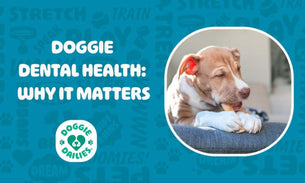Just like you, your canine companion needs to have healthy teeth and gums. Unlike their people, however, dogs can't do much to take care of their dental health. When there's a problem, they may hide the evidence by not showing any pain.
There are things you can do to keep your puppy happy and pain-free. Regular vet visits, at-home brushings and chew toys are some of the ways you can ensure those chompers stay strong and healthy for years to come.
Why Take Care of Your Dog's Teeth?
Without attention to dental health, your dog may suffer some major health problems. Some you would expect, like build up of plaque and cavities. According to the AVMA, cavities are less common in pets than their people, but some serious canine-specific tooth problems include:
- Infected, absessed, or broken teeth
- Periodontal (gum) disease
- Broken roots
- Mouth cysts or tumors
- Teeth misalignment, fractured jaw, palate defects
Obviously, these can be quite uncomfortable for your dog. Some problems also affect your dog's overall health, like periodontal disease. This condition not only causes problems in the mouth but may increase risk for diseases of the heart, kidney and liver. This happens because bacteria on the gums enters the bloodstream.
Dental health is important for all dogs, but small breeds like Yorkies and Pomeranians are at greater risk for gum disease. Even as young pups small dogs may have the first signs of periodontal issues. Teeth problems can start early, well before your pooch enters his senior years, so good preventive care is essential.
How Can You Spot Dental Problems?
Dogs unfortunately can't tell you when their mouth is starting to feel uncomfortable. You can know it's time for a vet check up with certain signs, like bad breath, visible buildup on the teeth, problems eating, pawing at the mouth, or lumps around the mouth.
What Can You Do?
The good news is that you can take control of your dog's dental health, and you can start at home. It is easiest to start the routines early, but even if you have a pooch who's getting on in years you can work with him to support dental health.
Brush your dog's teeth. This may seem like a tall order and it does require some patience. Organizations like the California SPCA have step-by-step guides on how to do it right. Use toothpaste made specifically for dogs (never use human toothpaste), and start slowly with just a bit of paste on a piece of gauze. Try to pick a time when your dog is at ease and speak soothingly to him to keep him relaxed.
Feed dry food. Your vet may have specific recommendations for your dog's diet that you should follow. But if you can, try feeding dry food for dental health. Wet food is more likely to sit on the teeth for longer, eventually leading to decay.
Offer chew toys. Your pet store may have toys that are designed to enhance canine teeth health. Give these a try and watch your dog to see if he's enjoying them.
See your vet. Regular checkups help you and your vet to monitor your dog's dental health and spot any early signs of problems. Your vet may recommend a professional dental cleaning, which typically involves putting your dog under anesthesia. The vet will take x-rays and clean thoroughly under the gum line.
Your Dog Will Thank You!
Most guardians relish the opportunity to spend more time with their dogs. You can make regular brushings a happy experience for you both, and keep him healthier over the long run. Often, preventive care is the best route to good health.








